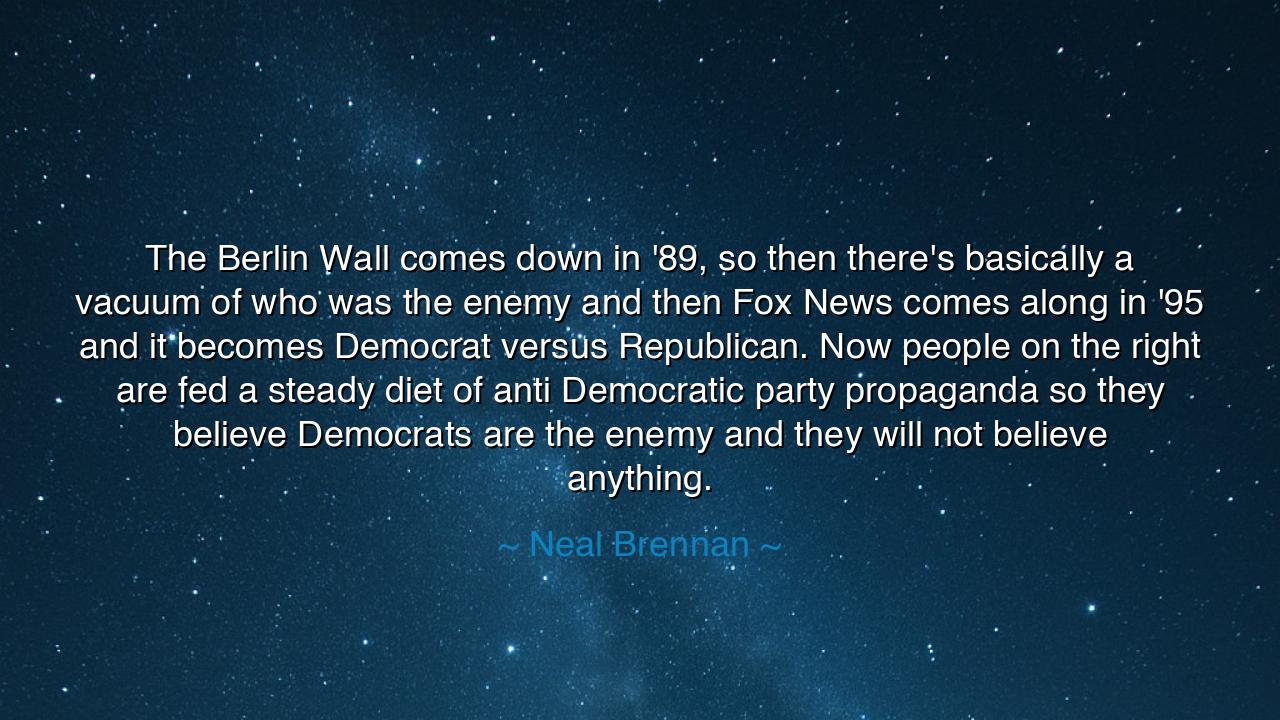
The Berlin Wall comes down in '89, so then there's basically a
The Berlin Wall comes down in '89, so then there's basically a vacuum of who was the enemy and then Fox News comes along in '95 and it becomes Democrat versus Republican. Now people on the right are fed a steady diet of anti Democratic party propaganda so they believe Democrats are the enemy and they will not believe anything.






In the words of Neal Brennan, there is not merely an observation, but a lament for the soul of an age: “The Berlin Wall comes down in '89, so then there's basically a vacuum of who was the enemy, and then Fox News comes along in '95 and it becomes Democrat versus Republican. Now people on the right are fed a steady diet of anti-Democratic party propaganda, so they believe Democrats are the enemy and they will not believe anything.” This is no mere chronicle of politics — it is a reflection on the ancient sickness of humanity: the need to define oneself through opposition, the craving to divide the world into us and them, and the tragedy that follows when truth itself becomes a casualty of war without end.
In the fall of the Berlin Wall, the world rejoiced, for a barrier of stone and fear had crumbled. For half a century, the world had been split in two — East versus West, Communism versus Capitalism, Soviet versus American. When the wall fell, many believed humanity had at last grown wise, that nations would learn cooperation in the place of conflict. But as Brennan reminds us, when the great enemy disappeared, a vacuum remained — and into that void, the human heart, unable to live without opposition, conjured new foes. Where once the world was divided by nations, now it would divide itself within — neighbor against neighbor, citizen against citizen.
The rise of Fox News in 1995 marked not merely a change in media, but in the mythology of a nation. For every age, like every empire, needs its storytellers — those who weave the fabric of belief. But when the storytellers choose division over discernment, their tales become poison. The airwaves, once meant to inform, became temples of ideology. Propaganda replaced dialogue; loyalty replaced thought. And so began a new war — not of armies, but of minds. The battlefield was no longer Berlin, but the living room; the weapon was not a rifle, but the word.
Brennan’s words echo the warnings of philosophers long gone. The historian Thucydides, writing of the Peloponnesian War, described how Greek city-states tore themselves apart through civil strife, and how “words themselves lost their meaning.” In those dark days, courage became recklessness, prudence became cowardice, and loyalty to the faction replaced loyalty to truth. The ancients knew: when people define their virtue only by the vilification of others, their civilization begins to rot from within. So too does Brennan warn of a modern civil decay, masked by laughter, opinion, and the illusion of choice.
And yet, there is something timeless in this cycle. When an enemy disappears, humanity, unable to stand in unity, invents another. The shadow we fight outside is but the reflection of the shadow within. The vacuum Brennan speaks of is not political alone — it is spiritual. For when meaning departs, fear rushes in to take its place. To fill that emptiness, people seek identity in tribe, in party, in outrage. They are fed not nourishment, but the steady diet of fear — and fear, once consumed daily, becomes faith. Thus, they cease to believe anything that challenges the tale that sustains them.
Yet even in this darkness, wisdom offers a path. The remedy is not silence, but awareness — to see that truth does not belong to sides, but to seekers. The philosophers of old would remind us that to know the enemy too well is to become him, and that the only true victory lies in understanding. In every age, there have been those — like Socrates, like Lincoln, like Gandhi — who refused the easy comfort of certainty. They listened, questioned, and stood in the open field between worlds, where mockery and misunderstanding await. But it is in that middle ground, barren though it may seem, that peace is born.
Therefore, let the lesson of Neal Brennan’s words endure: when the world offers you sides, choose sight. When voices demand hatred, choose hearing. When fear seeks to fill your heart, answer with discernment. For division will always beckon, whispering that you belong only to one half of a broken world. But wisdom knows better. It belongs to no faction, no party, no tribe — only to those who are brave enough to love truth more than victory.
And so, children of the modern age, take heed: walls will rise and fall again — between nations, between people, between hearts. But the greater wall, the invisible one of belief and bias, stands only until you choose to see through it. Tear it down within yourself first, and perhaps the world will follow. For only when we cease to hunger for enemies will humanity remember what it means to be whole.






AAdministratorAdministrator
Welcome, honored guests. Please leave a comment, we will respond soon